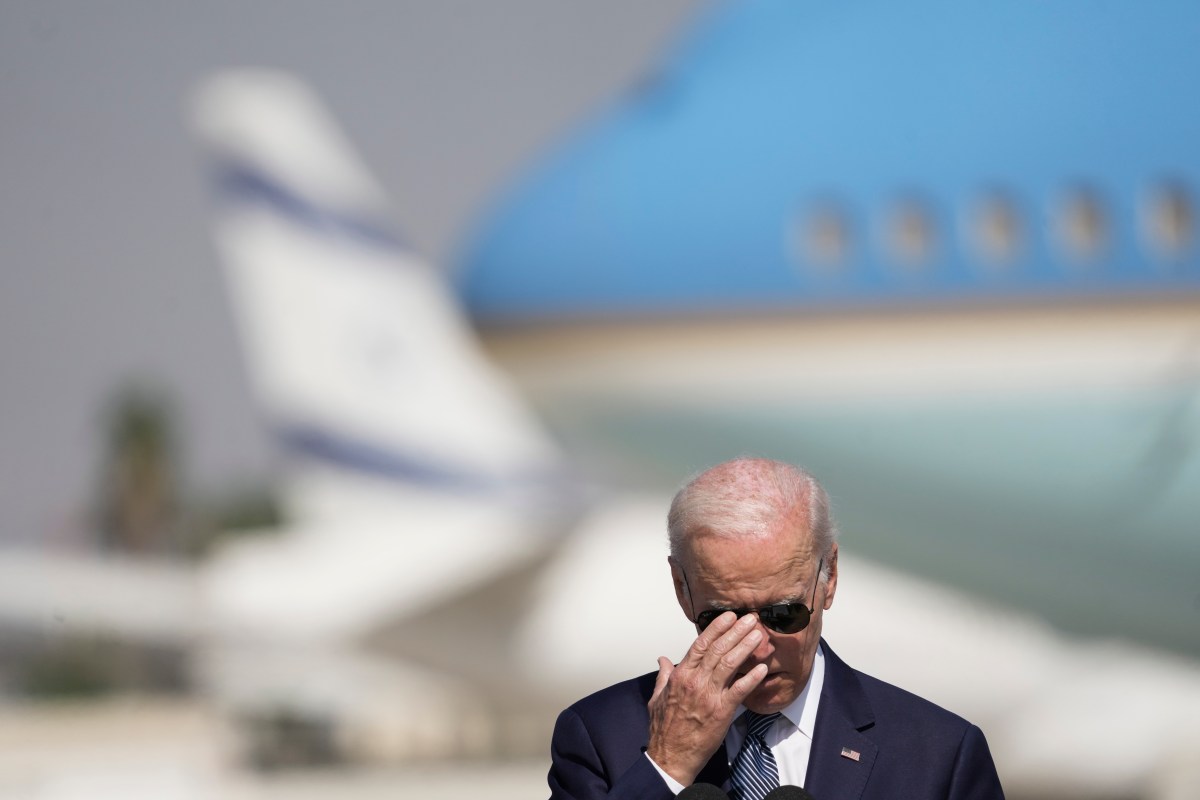Looking at Joe Biden’s negative job approval ratings, especially on the economy, brings to mind a metaphor. Imagine a cross-country airline flight. The skies are clear during most of the trip, but then the weather turns rough. The plane starts pitching to and fro.
The pilot gets on the intercom, and instead of explaining the situation calmly and accurately, he insists that the plane is not, in fact, pitching to and fro, and that everything is just fine. As the to-ing and fro-ing gets worse, the pilot comes back on the intercom and blames the turbulence on China and instructs the passengers to drink the bleach the flight attendants will be bringing around.
The freaked-out cabin crew and air traffic controllers succeed in relieving the pilot of command and placing the copilot in charge. But then the weather turns even worse. The copilot is having to steer through a combination of a tornado, a hurricane, and smoke from wildfires. Passengers are getting bounced out of their seats, causing injuries and panic. These are the most challenging flying conditions that anyone in aviation can remember. But the copilot, a veteran nearing retirement age, muscles through the turbulence and somehow manages to land the jet. The passengers exit the aircraft, relieved to be alive.
But then the original pilot goes on national TV and insists that he had everything under control until the copilot took over, and that it was a travesty and a fraud that he was relieved of command. He then reminds everyone that the weather was clear during most of the flight, and the passengers never had it so good. And about half of the passengers and the public say, “You know, he’s right. I want him to be the pilot on my next cross-country flight.”
This little parable illustrates the dynamic that could well determine the 2024 presidential election results—and, hence, the fate of American democracy. If the race centers on comparing the conditions the country was in under each president, Donald Trump will likely win. After all, the average American’s economic well-being, as measured in real income growth, was better during Trump’s years in office than it has been during Biden’s.
If, however, the 2024 race is a comparison of the performance of each president given the conditions each faced, Biden has a better chance.
Indeed, it ought to be a slam dunk. Trump was handed a booming economy by the Barack Obama/Joe Biden administration, managed for three years not to screw it up, then encountered a crisis, COVID-19, and choked. Biden not only inherited the pandemic and the consequent economic turmoil but also was soon hit with a virus-induced meltdown of global supply chains and Vladimir Putin’s invasion of Ukraine. The resulting inflation spike undercut the substantial wage gains Americans were earning thanks to a jobs boom fueled partly by the massive economic stimulus Biden had signed in early 2021. But throughout 2022, his administration detangled supply chains, rallied NATO to help Ukraine stop the Russians, drove down oil prices by aggressively tapping the Strategic Petroleum Reserve, and challenged the price gouging of monopoly corporations with antitrust policy and other actions. As a result, inflation eased considerably while the economy continued to hum. Since October 2022, real incomes (that is, after inflation) for average Americans have grown sizably, though not as much as they did during the Trump years, as the Washington Monthly contributing writer Robert Shapiro recently reported.
And those are just the immediate gains. Biden signed a massive infrastructure bill, which Trump promised but failed to do. Through the CHIPS Act and other measures, Biden has also engineered a manufacturing investment boom, which Trump also promised but failed to deliver (his trade wars led to a slump in the sector even before the pandemic hit). The economic benefits of these achievements have barely begun to be felt and will likely last for many years.
And yet, most voters give Trump higher marks on managing the economy than Biden. That might shift if real incomes continue to grow between now and the election. Still, if the upcoming presidential campaign is fought over the question “Under whose administration was your economic life easier?” Trump will have a clear advantage. If the question becomes “Whose administration built an economy that will bring a better future?” Biden has a decent shot.
But that will only happen if the press spends less time parsing the candidates’ poll numbers and more time analyzing their policies, as we do in this issue of the Monthly. Ellie Houghtaling explains how the Biden administration’s new student debt repayment program, SAVE, transformed her life and is delivering debt forgiveness to millions, even as progressive groups badmouth it and the press ignores it. Phillip Longman reveals how the administration’s upcoming antitrust trial against Google’s ad tech monopoly could revive the business of journalism, even if few reporters have a clue. And Jonathan Alter and Cliff Sloan detail the critical issues on which Trump’s upcoming federal election fraud trial will hinge.
This kind of substantive, beyond-the-horse-race coverage is what the founder of the Monthly, Charlie Peters, who died on Thanksgiving Day, demanded from those of us who worked for him (see our tributes to Charlie). It is what this magazine will be providing between now and November.



